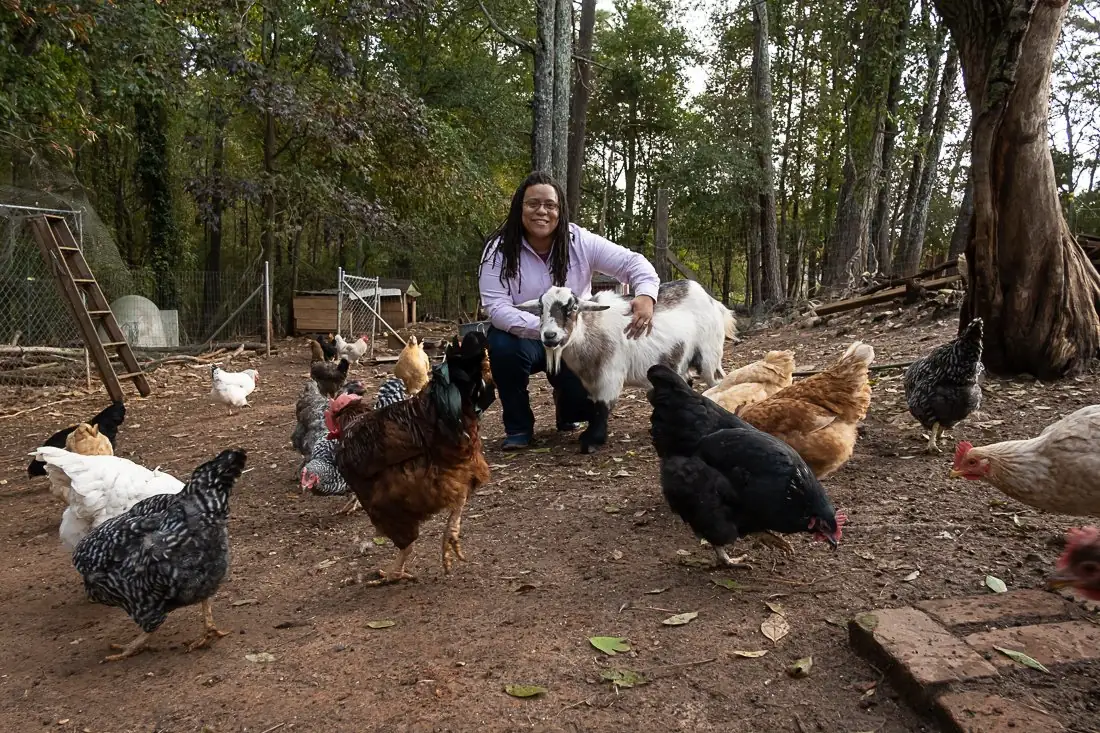
Georgia State Senator Kim Jackson was born with her hands in the dirt.
“I grew up in the rural south on a farm where we ate vegetables all the time,” she explains. “I was raised in 4H.” This life shaped her approach to food. “I may not love Brussels sprouts,” she laughs, “but I developed a taste for them!”
Her focus on Georgia food, farms, and food security infuses her work on the senate Agriculture committee. “I am who I am in part because the way of living and working on a farm as a child informed me about the importance of being close to the earth and close to my food.”
Senator Jackson – “call me Kim!” – views her role as a senator through many lenses. Kim and her wife, Trina, run a small urban farm at their 5 acre home in a mostly black and brown, fairly international neighborhood in Stone Mountain. Kim is also an Episcopal priest who for a time served as vicar at Emmaus House in Peoplestown and ran their Freedom School. She notes that her introduction to food insecurity happened here.
“I met children who had no idea” about vegetables. “We showed them a zucchini, a squash – even a tomato, and they couldn’t identify it.” This opened a conversation for Kim. “What do they have access to?” she wondered.
“The outcomes for these children were not great. The food they had access to comes from the corner store. 87% of the children did not read at grade level. I have no doubt that their ability to learn was greatly hampered by lack of access to food. You cannot learn if you are hungry. That’s just a fact. And your brain doesn’t work well when it’s not being fed nutritious food.”
“I’m so glad about the senate committee” that is exploring Georgia food insecurity, Kim says. Success “is going to require public-private partnerships,” she observes. She brainstorms that “the Georgia Grown program run by the Georgia Department of Agriculture could [potentially] do some really creative and incentivizing programs,” to improve wholesome food access, like popup farmers markets at MARTA stations.
Kim was pleased to know that Wholesome Wave Georgia’s Georgia Fresh for Less program is an example of a successful public-private partnership presented to the committee. Georgia Fresh for Less provides great health and economic results. Money goes into farmer’s pockets; government expenditures reduce; and as positive health outcomes for food stamp (also known as SNAP) recipients increase, emergency room visits and hospital bed use decrease.
When creating policies around healthy food access, “a lot of it starts with money,” Kim reflects. “I had $100,000 appropriated from the state budget to go to a cooperative in south Georgia so small farms could share a refrigerated truck that takes their food to the Albany school system. This was the first time these farmers received state funds.”
Experience as a small urban farmer has made Kim conscious of how hard it is to move produce. “We need to be intentional about creating pathways that allow the small farmer to get to the consumer.” She is invested in “keeping our Georgia grown food in Georgia, in our neighborhoods and communities.” Kim emphasizes that fresh food through any program must be made accessible to those without transportation or nearby markets.
As a member of the Agriculture committee, Kim’s priority is to support small and medium size farms in Georgia, and especially those owned by black and brown people. “I think farming is a pathway to liberation. I am deeply invested in passing legislation and policies that protect our small farms.” She especially wants to provide “opportunities for metro folks to learn how to grow their own food,” like in the WWG Plant to Plate program, and for young people to farm “so that small and midsize farms [will] continue from generation to generation.”
Kim feels hope springs from farming. Among other values, Kim notes how small farming builds community. At her farm, “we sell chicken and duck eggs, some produce, and honey.” She bonds with her community over “teaching neighborhood kids that eggs come in different colors” but are the same inside. People “know they can swing by and get a pint of blueberries. A neighbor from Panama ate her first fig here at age 65! Having a centralized gathering spot [around food] allows neighbors to get to know each other,” which makes all of Georgia better.



